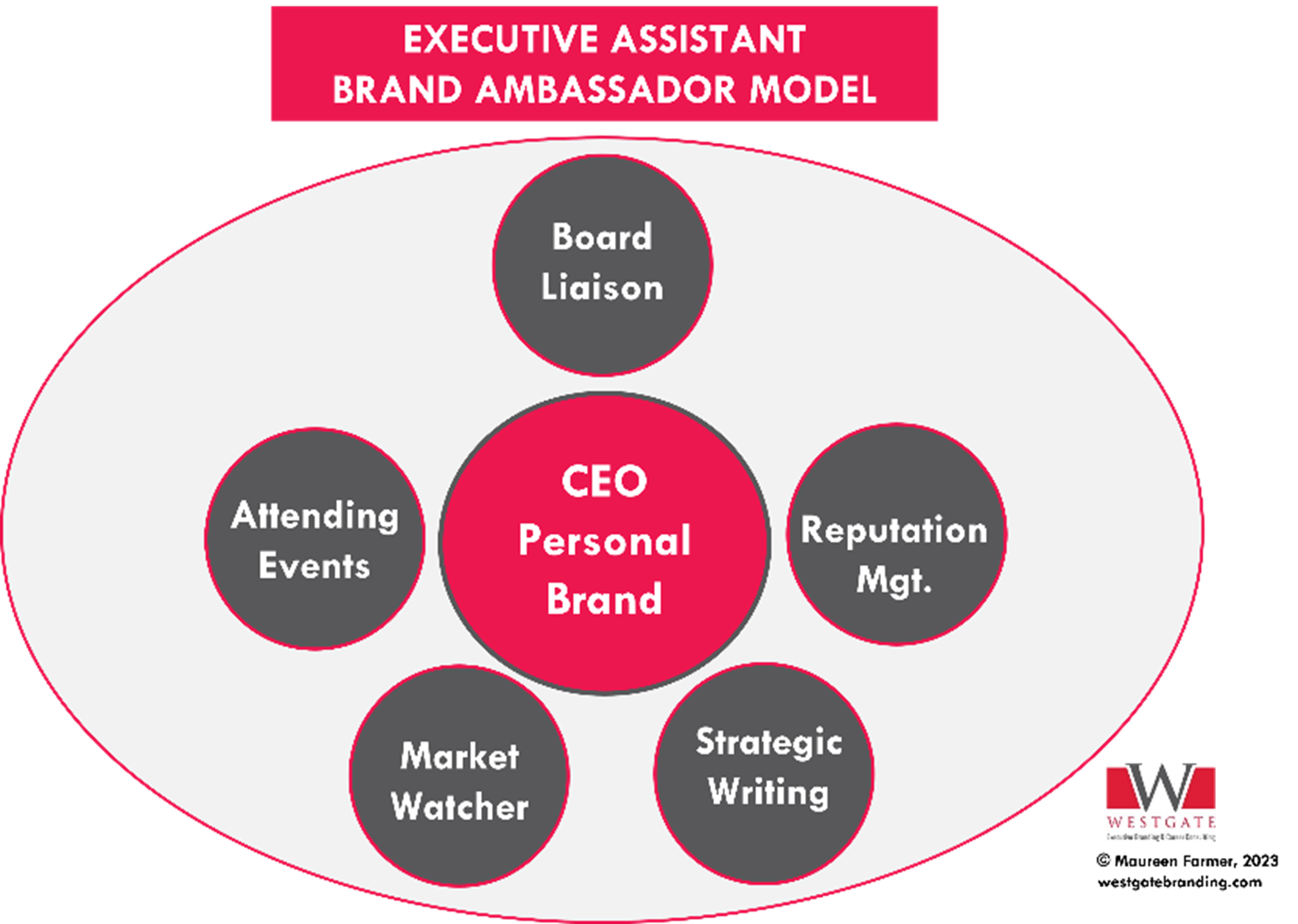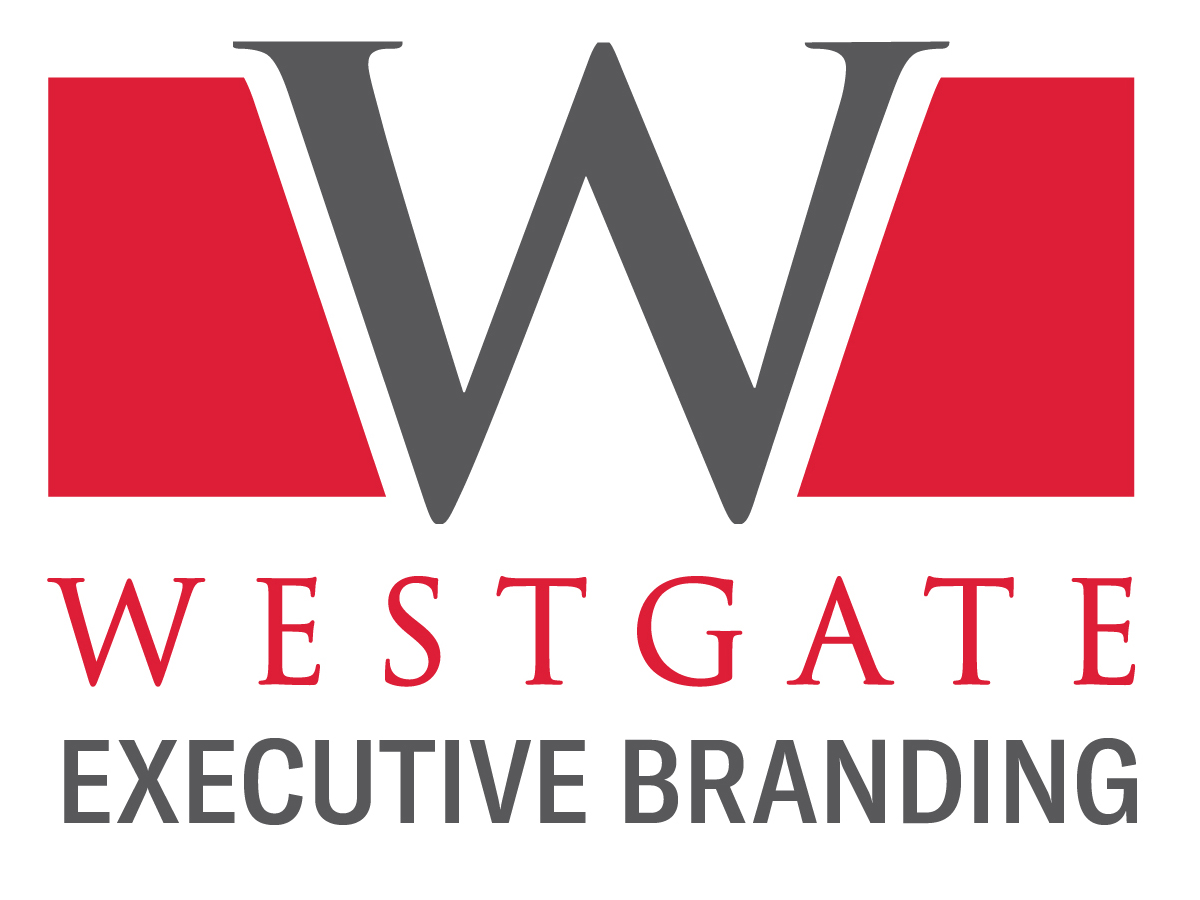Driving peak performance for CEOs and their boards, Westgate Executive Branding Offers Premier Advisory Services & Personal Branding Consulting for High-Profile Leaders. About Maureen—CEO & Founder.

Your executive assistant is a corporate asset manager.
Use our Brand Ambassador Model with your assistant to communicate your personal brand, amplify your efficiency, and build capacity as a leader.
Business leaders often consider their assistant to serve as a task-oriented resource who manages travel plans, processes expense reports and organizes meetings. While this is important, you could leave money on the table by not trusting your assistant to act on your behalf.
And this could be a big mistake.

My experience as the assistant to a multibillion-dollar executive
I know this because I served as an executive assistant to a C-level executive of a then $4 billion public company in an industry with tiny margins and high volume. Operational efficiency was critical to achieving profitability in a highly regulated industry with growing regulatory requirements.
And we had just gone public.
As the executive assistant in this company for over ten years, I became the executive’s de facto chief of staff. Over a short timeframe, I was trusted to make significant business decisions. I enjoyed a large (>$50K) signing authority, managed a >$10 million budget (including accruals and forecasts), and managed a significant portion of the executive’s business because I understood what was at stake.
Trust in the assistant is necessary
But it required him to trust me, which is why many executives fail to leverage this lucrative human resource that can save time, build capacity, and amplify the executive’s personal brand making him look like a hero in front of the board.
Here’s how to build a relationship with your assistant:
The hourly rate for a CEO in the United States, according to the Bureau of Labor Statistics, is between $78.69 and $129.21. The hourly rate for an executive assistant ranges between $19.14 and $40.
To put things into perspective, a typical task for a CEO that is not administrative in nature could be strategic planning. Let's assume that it takes the CEO 10 hours to complete this task. An executive assistant, with the appropriate skill set and training, could complete the same task in 6 hours. This would result in a time savings of 4 hours for the CEO.
Over the course of a month (20 workdays), the CEO would save 80 hours by delegating this task to the executive assistant. Over a quarter (60 workdays), the CEO would save 240 hours, and over a year (240 work days), the CEO would save 960 hours. And so on.
If we assign a value of $78.69/hour to the CEO's time, the time savings over a year would be worth $74,865.60.
To determine if the executive assistant is the most appropriate resource for a task, it is important to consider their skill set, experience, and workload. The executive assistant should have the appropriate skills and experience to complete the task, and their workload should not be overly burdened.
To engage the executive assistant, the CEO should clearly communicate the task, provide necessary information and resources, set expectations, and establish a clear timeline for completion. The executive assistant should also be given the autonomy and authority to complete the task.

Scheduling Decisions
Understanding the importance of the CEO’s meetings and their stakeholders is critical. Meeting with a state governor, municipal leader, or CEO of a competing industry requires their own communications strategies. Positioning you appropriately with these offices will make a lasting first impression. A lasting first impression is memorable.
Help your assistant understand the relationships and what's at stake today
Who should you spend your time with, and with what priority of cadence? When your assistant understands the management team, your strategic plan, the board of directors, your customers, and your products, they can amplify your performance.
I never realized my value at the time. Because I was involved in the day-to-day decisions and the challenges and understood the relationships, I could add value because I know who needed to be involved in decisions and crises as they arose.
As the management committee secretary, I coordinated the agenda for our bi-weekly meetings and getting access to the business leader was very challenging. We needed to make decisions about topics for the agenda. I will admit to missing a good night’s sleep often as I contemplated the agenda and what it would look like. Before a specifically important management committee meeting, I booked a flight with the CEO (without his knowledge) for a day trip. I required his input into the agenda. He appreciated my efforts, and we collaborated on the agenda for the following Tuesday’s meeting.
Raising visibility through strategic writing
Publishing and speaking help to raise the CEO’s visibility, authority, and credibility. The assistant can serve as a ghostwriter and transform your ideas and experiences into a whitepaper that will interest your industry. The content may be repurposed into a book (later on), content for a podcast (as a guest), and as an industry keynote presentation.
During my tenure in financial services, I wrote a whitepaper on executive compensation for my CEO. I know he trusted my work and was pleased with the product because he made zero edits to the whitepaper and proudly distributed the product to the board and senior management team. Eventually, it was used as part of an industry think tank (CEO Roundtable) event.

Reputation management
Your brand speaks for you when you’re not in the room. The assistant can monitor your reputation across platforms and report to you any inconsistencies. You can then use your key messaging and unique value proposition to address these issues. From Glassdoor reports to rumblings in the workforce, being aware of inaccurate messaging and perceptions allows you to manage your personal brand effectively.
Attending events
Attending events on behalf of the CEO has tremendous value, obviously. A person cannot be in both locations at one time. The assistant can represent the CEO, and when they are well versed in the topic and understand the CEO’s motivations, it can amplify performance.
Market watcher
Most CEOs don’t track their competitors or industry peers. CEOs are time-poor. Information is powerful, and when there is deliberate monitoring of the competition (there are so many choices today!), issues can be addressed quickly.
Gain trust early
When you and your assistant trust each other, you can optimize your performance early and fast, but never at the cost of quality. In the early days, my boss and I traveled the territory together, and I learned about the business from his perspective. It was a smart decision on his part because I could make decisions on his behalf when I understood what was at stake. It required trust and transparency.
Engage your assistant with important plans early -- when the board delivers them
In those days, I felt included and an essential team member. While I was not a decision-maker, I was a decision influencer. The CEO’s direct reports respected me, and I was always transparent with them. We would hold court in my office and discuss priorities.
Capital markets & the stock exchange
The rigors of public reporting require on-time analysis, and preparation for the analyst’s calls is a pivotal time each quarter. Always recorded and scrutinized by the media, the CEO needed to be well-versed, prepared, and somewhat scripted. You have a tremendous asset to leverage when your assistant understands the issues, what’s at stake, and where the vulnerabilities lie.

Board of Directors liaison
The CEO’s relationship with the board of directors is one of the CEO’s most important constituencies. When the assistant understands the nature of the relationships and the functions of the board and its committees, she/he/they will anticipate issues and proactively address them. Keeping the lines of communication open (and often) will protect important relationships.
Know your assistant's aspirations and ambitions
If your assistant is like I was, she/he/they are planning their future career. Serving the C-suite is a unique opportunity to learn the business from the business leader’s perspective. As close to the top as one gets (next to the board, investors, and regulators), the assistant will learn what’s most important to the decision-maker and why. When an assistant understands what’s at stake, they can support you in decision-making (decision support), prioritization, and delegation enabling the CEO to focus on the most important things.
How to build trust with your assistant
As you watch your assistant in action, you can create an opportunity to discuss your vision for your team and the business. Be transparent and direct with your assistant. Some assistants will want to take on the responsibility of acting on your behalf, and some won’t. If the assistant wants to help, you have a trusted ally who will make you look like a hero in front of your board, employees, and customers. Don’t underestimate your assistant’s ability to perform, produce, and amplify your efforts.
It will require transparency, honesty, and candor.
Take your assistant offsite—perhaps a restaurant or offsite corporate office. Establish confidentiality and let them know what you’re seeking. Determine their interest early in the meeting. Connect the activities and mission to the why or reason. What do you want to achieve, and what’s most important to you?
Your reputation is very important to you (and your family and your board). Lay out the expectations with your assistant early, so they understand how to protect your reputation and share your brand.

Establish expectations and meet with them regularly
Keeping your assistant apprised of the goings-on at the moment is important because it will serve as a conduit to the front-line employees, the media (or PR), regulators, and customers. You may believe that this is too much responsibility to place on your executive assistant. And it may be. However, if you can engage your assistant in your vision, she/he/she can help you execute your plan safely and confidently.
Compensation differences
Your compensation may be calculated at $1500 per hour (as an example). If your assistant is earning $80 per hour but can deliver value on your behalf, what is the ROI of that? Not every assistant wants to take on more than they are paid for, but I was ambitious and keen to make the CEO happy and win his trust and confidence. When I delivered my value proposition, I understood that he amplified his tenfold.
Recognize performance and reward loyalty
Most CEO mandates last fewer than 10 years. A loyal, smart, and trustworthy executive assistant can help you win faster with more confidence. Reward loyalty. Help your assistant with their career plan by asking what they want out of their career and then help them get there.
To the executive assistant
As a corporate asset manager, if your CEO could use your help at a deeper level beyond administrative, have that discussion with him/her/them. In my experience, I’ve seen good results by offering to sign a non-disclosure agreement to demonstrate your degree of trust and commitment to their goals and their critical relationships. Confidentiality will be a key component of the employment contract. Still, it never hurts to revisit one of the assistant's most delicate and valuable assets—access to highly confidential and sometimes controversial information.

